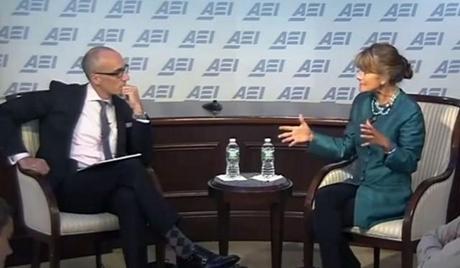
When “3 billion people on the planet making less than $3 a day, [are] effectively cut out of society, we are missing the opportunity of all those people to be our musicians, our Einsteins, and our professors- it is really all of us that lose.”
In an event on harnessing the power of markets to tackle global poverty, American Enterprise Institute President Arthur Brooks and Acumen founder and CEO Jacqueline Novogratz highlighted the role markets can play in enabling the poor to participate fully in society.
By treating the poor “as assets to society,” rather than liabilities, “we’re going to enliven their capital and that will also give them earned success and dignity,” said Brooks. Novogratz’s philosophy is to do just that – by investing in the poor through so-called “patient capital.”
CIPE’s work in developing countries around the world has shown that institutional barriers often hold back would-be entrepreneurs and business owners from achieving their full potential and helping lift themselves and their communities out of poverty. One of the most difficult such barriers to overcome is the lack of access to capital, which makes it difficult to start or expand a business in many parts of the world.
Besides traditional market-oriented and philanthropic approaches to confronting poverty, Novogratz suggests patient capital as a “Third Way” which, while fundamentally market-based, takes a longer-term view more in line with the needs and priorities of the poor.
In her career on Wall Street, Novogratz realized both the power of traditional financial markets and their limitations when it came to serving the very poor. On the other hand, her philanthropic efforts within Rwanda provided exposure to the tendency of top-down approaches to promote dependence.
In founding Acumen, a non-profit using capital to make long term – “patient” – investments in high-impact companies, she sought to bridge this gap. Acumen’s goal is to invest in ways to deliver crucial services in the gaps where neither the private nor public sector is working effectively. Framed as a business transaction, the poor are no longer viewed as beneficiaries of a gift or grant recipients, but rather as real customers whose preferences shape the types and characteristics of products needed in these markets.
Thus markets become “a listening device for the poor,” a new way of considering the role capitalism can play in international development. As Brooks notes, in political discussions free enterprise is often associated with the political right while discussions of poverty are associated with the left. By focusing on the role that free enterprise can play in alleviating poverty, organizations like Acumen and CIPE show that these ideas are not mutually exclusive.
Furthermore, Novogratz noted that the poor want markets to work for them, because they live in some of the cruelest market systems in the world, which are characteristically unfair and highly corrupt. Building fair, inclusive market systems where businesses of all sizes compete on a level playing field helps to reduce these inequities and create greater opportunities for everyone.
In Acumen’s view, true poverty is more than the technical definition of living on less than $1.25 a day. Rather, it is connected to a measure of human dignity. Truly escaping poverty means the ability to answer the question “as a human being, do I have choice, freedom, and am I participating?”
Working from this definition of poverty, rooted in dignity rather than income, Acumen uses a different set of goals to measure success. Unlike traditional venture capital firms which aim for successful exits within three to five years, Acumen’s “patient” investment strategy emphasizes leadership and showcasing examples of successful companies, which will ultimately help create a more sustainable and inclusive business environment for all.
In redefining poverty and realizing the positive potential of enterprise, we can throw traditional political connotations aside and come together in working towards building thriving ecosystems that nurture innovative entrepreneurship, inspire strong leadership, and fully engage all of society in order to most fully unlock the world’s economic and human potential.

